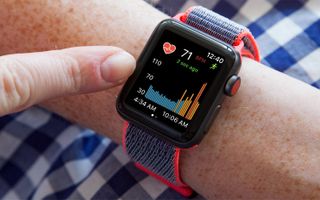Apple Watch Can Accurately Detect Irregular Heart Rhythm
A study of more than 9,000 people shows that fitness trackers and smartwatches with optical heart rate sensors can predict atrial fibrillation with 97 percent accuracy.
Your Apple Watch can detect irregular heart rhythm just as accurately as an electrocardiogram, which is the gold standard for diagnosing atrial fibrillation.

Irregular heart rhythm is the leading cause of stroke and causes about 150,000 deaths in America every year. Often people feel no symptoms of atrial fibrillation and don’t know they have it until they experience a stroke.
The final results of the research, conducted by the Apple Watch heart rate-tracking app Cardiogram in partnership with the University of California San Francisco’s Health eHeart Study, will be published in the peer-reviewed medical journal JAMA Cardiology.
The study tracked 9,700 people, 51 of whom wore their Apple Watches in a hospital setting while experiencing atrial fibrillation. That group of people underwent cardioversion, a shock to the heart to reset its rhythm, while wearing their devices in Workout mode so the watch could continuously track heart rate.
MORE: How to Use the Apple Watch - Tips, Tricks, Apps and Bands
Cardiogram’s software takes the data from the optical heart rate sensor in the Apple Watch and analyzes it to detect AFib. Cardiogram used the data from the group of people who experienced atrial fibrillation and cardioversion, along with data from the broader group of study participants, to train a neural network to predict atrial fibrillation. The final results of the study confirm the early data Cardiogram announced in May 2017.
The fact that these results are being published in a peer-reviewed medical journal is a milestone, not just for the Apple Watch but for any other device with an optical heart rate sensor. The AFib detection accuracy extends to Fitbit and Garmin bands, Wear OS (formerly Android Wear) watches and Samsung devices, Cardiogram co-founder Brandon Ballinger said in an interview.
Sign up to get the BEST of Tom’s Guide direct to your inbox.
Upgrade your life with a daily dose of the biggest tech news, lifestyle hacks and our curated analysis. Be the first to know about cutting-edge gadgets and the hottest deals.
“This milestone is the first time that we’ve been proven that this technology can be medically accepted,” Ballinger said. “It’s the first step to doctor acceptance of this technology and insurance coverage of this technology.”
Insurance companies are offering programs that make fitness trackers cheaper for employees. UnitedHealthcare recently added the Apple Watch to a program that allows people to earn money for activity. Aetna plans to give away free Apple Watches this year as part of its corporate wellness partnerships.
But those programs are largely focused on encouraging people to be more active. Ballinger expects that proof of concept studies like Cardiogram’s will establish certain smartwatches and fitness bands as diagnostic tools.
Apple is conducting its own study in partnership with Stanford Medicine on how accurately the Apple Watch can detect atrial fibrillation. The company has not yet released preliminary results from that study, which began last November.
Cardiogram is also studying how accurately the Apple Watch can diagnose diabetes, sleep apnea and high blood pressure. About 250,000 people use its app daily. Cardiogram's app doesn't currently offer any features that diagnose health issues yet, but the company is working on it.
Ballinger hopes to continue studying the Health eHeart participants, much like the Framingham Heart Study followed its participants.
“The way you study these conditions is a large cohort and following them over time,” Ballinger said. “My hope is that 10 years from now or 100 years from now there will still be discoveries.”
Caitlin is a Senior editor for Gizmodo. She has also worked on Tom's Guide, Macworld, PCWorld and the Las Vegas Review-Journal. When she's not testing out the latest devices, you can find her running around the streets of Los Angeles, putting in morning miles or searching for the best tacos.
